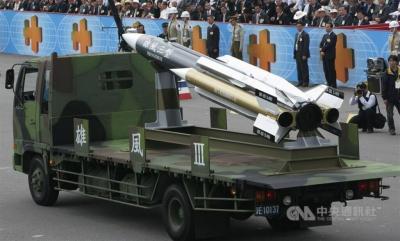There were chaotic scenes outside the Taipei District Court yesterday as the trial of suspected cat killer Chan Ho-yeung (陳皓揚) opened, with angry protesters scuffling with police and some breaking through a cordon to attack Chan as he left the building.
More than 100 animal rights activists gathered in front of the court to protest against the killing of popular stray cat “Big Orange” in December last year, shouting that Chan was “human trash” and “a low life” and demanding that the court sentence him to the heaviest penalty stipulated by the Animal Protection Act (動物保護法).
Chan has also been accused of beating to death a cat known as “Ban Ban” (班班), that had been kept as a pet by a vegetarian restaurant and went missing on Aug. 2.

Photo: CNA
The 22-year-old National Taiwan University (NTU) graduate student from Macau represented himself without a lawyer at the proceeding, where he was charged with violating the Animal Protection Act over Big Orange’s death.
Chan admitted guilt, telling judges: “I have a psychological problem, and I could not control the compulsion to kill a cat. So when I saw Big Orange as I was passing by, I could not restrain myself from committing the crime.”
Prosecutors said NTU had provided Chan with psychological counseling, but he still allegedly killed a second cat, which shows that he has deeply ingrained antisocial tendencies and lacks compassion for animal life.

Photo: Huang Yao-cheng, Taipei Times
Therefore, counseling is insufficient, and Chan should be ordered to undergo psychiatric treatment at NTU Hospital, to stop him from torturing and killing any more cats, prosecutors said.
The judges released Chan on NT$200,000 bail. His next court appearance is scheduled for Sept. 22.
Trees Party Secretary-General Lee Chien-ming (李建明) said that the courts usually treat animal abusers leniently.
Chan is a repeat offender, as he allegedly killed another cat in Taipei on Aug. 2, and he should be punished proportionately and ordered to undergo therapy, Lee said.
Animal rights advocates called on the legislature to immediately approve draft amendments of the Animal Protection Act, which would double the penalties for animal cruelty from a maximum one-year prison sentence and a fine of between NT$100,000 and NT$1 million (US$3,197 and US$31,969) to a maximum two-year prison sentence and a fine of between NT$200,000 and NT$2 million.
Democratic Progressive Party Legislator Huang Wei-cher (黃偉哲) said animal cruelty is an early predictor of later violent crimes against people, and increased penalties for animal abuse are necessary to prevent more serious crimes.
Animal rights advocates from Macau said they suspect Chan was behind the deaths of three stray cats in Macau during the Lunar New Year holidays, and they were concerned that Chan would harm more animals if he was released and deported to the territory.
Chan was escorted through a furious crowd to a car supplied by NTU, with protesters throwing objects and trying to obstruct the car.
Before he got into the car, protesters scuffled with police trying to protect Chan, who was punched, gouged, and put in a headlock by members of the crowd.
Several court bailiffs and journalists were knocked down by the surging crowd, with some sustaining minor bruises.
Two police officials also received minor injuries during the commotion.

STATS: Taiwan’s average life expectancy of 80.77 years was lower than that of Japan, Singapore and South Korea, but higher than in China, Malaysia and Indonesia Taiwan’s average life expectancy last year increased to 80.77 years, but was still not back to its pre-COVID-19 pandemic peak of 81.32 years in 2020, the Ministry of the Interior said yesterday. The average life expectancy last year increased the 0.54 years from 2023, the ministry said in a statement. For men and women, the average life expectancy last year was 77.42 years and 84.30 years respectively, up 0.48 years and 0.56 years from the previous year. Taiwan’s average life expectancy peaked at 81.32 years in 2020, as the nation was relatively unaffected by the pandemic that year. The metric

Taiwan High Speed Rail Corp. (THSRC) plans to ease strained capacity during peak hours by introducing new fare rules restricting passengers traveling without reserved seats in 2026, company Chairman Shih Che (史哲) said Wednesday. THSRC needs to tackle its capacity issue because there have been several occasions where passengers holding tickets with reserved seats did not make it onto their train in stations packed with individuals traveling without a reserved seat, Shih told reporters in a joint interview in Taipei. Non-reserved seats allow travelers maximum flexibility, but it has led to issues relating to quality of service and safety concerns, especially during

A magnitude 5.1 earthquake struck Chiayi County at 4:37pm today, the Central Weather Administration (CWA) said. The hypocenter was 36.3km southeast of Chiayi County Hall at a depth of 10.4km, CWA data showed. There were no immediate reports of damage resulting from the quake. The intensity of the quake, which gauges the actual effect of a seismic event, measured 4 in Chiayi County, Tainan and Kaohsiung on Taiwan's seven-tier intensity scale, the data showed. The quake had an intensity of 3 in Chiayi City and Yunlin County, while it was measured as 2 in Pingtung, Taitung, Hualien, Changhua, Nantou and Penghu counties, the data

The Supreme Court today rejected an appeal filed by former Air Force officer Shih Chun-cheng (史濬程), convicted of Chinese Communist Party (CCP) espionage, finalizing his sentence at two years and two months for contravening the National Security Act (國家安全法). His other ruling, a ten-month sentence for an additional contravention, was meanwhile overturned and sent to the Taichung branch of the High Court for retrial, the Supreme Court said today. Prosecutors have been notified as Shih is considered a flight risk. Shih was recruited by Chinese Communist Party (CCP) intelligence officials after his retirement in 2008 and appointed as a supervisor